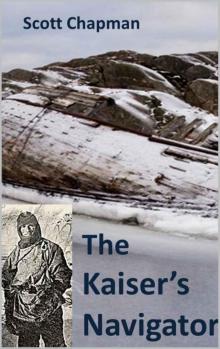- Home
- Scott Chapman
The Kaiser’s Navigator (Peter Sparke Book 2) Page 2
The Kaiser’s Navigator (Peter Sparke Book 2) Read online
Page 2
His family's small apartment was so overcrowded that it was impossible to concentrate there. So, he was alone, in a corner of the lab late at night, studying for his engineering classes when the door opened and the figure of the President stood in the doorway.
"What are you doing?" asked the President calmly.
"I am studying, sir," said young Heinl, wondering how many things he was guilty of by doing this. Certainly using the company desk and electricity illegally.
Without a word the President walked over to the desk where the boy was working and looked at his notes.
"May I?" he asked gesturing to his notebook.
Heinl stood back from the desk and the President walked over, putting on a pair of spectacles to peer at the scribbled notes. After a lengthy inspection the President straightened up and replaced the spectacles in his coat pocket.
"Turn off the lights when you are finished, please," he said, and left.
That week he found a small bonus in his pay packet. A month later he was promoted. At the end of that year, the President’s secretary walked through the lab to Heinl's bench and in front of the whole department told him to bring his grade report to the President.
He was physically trembling as he waited with his grade report and notebook outside the office, unable to even sit. On being summoned through by the secretary, he stood before the featureless metal desk of the President as his report was read. The President looked up over the rims of his glasses, realising that young Heinl was standing and waved to the chair.
"Sit, sit down, please," he said before returning to the report.
"Would you be willing to accept our financial support for your studies?" asked the President after reading the report.
"Yes, sir," answered Heinl.
The President handed the report back to Heinl without a word and went back to work on something else. After a minute of standing in silence, Heinl realised the meeting was over.
Thereafter, all his fees were paid by the firm and at the end of every term the ritual was repeated. Once his course was completed and his diploma awarded, he was again summoned.
"Are you willing to take on the challenge of an advanced degree at the Institute of Mining?" asked the President.
"Yes, sir," answered Heinl.
Heinl went to the Institute and earned a first-class degree.
The President never spoke more than a few words to Heinl at a time, never offered a word of encouragement or praise, but Heinl would have done anything to merit his respect. Heinl found himself constantly offered more and tougher challenges and he often felt the unseen hand of the President behind his career.
Heinl had been in the company for almost thirty years when the President died. He was called before the Board and to his unending shock he was told that the recently deceased President had proposed that the future of the firm should be entrusted to Heinl. His actual note to the Board had said, "Ask Heinl if he is willing to accept the challenge of being the next President."
The Board supported the wishes of the late President and Heinl was catapulted into the responsibility of running the firm. Now it was his job to find those people who would either take the company forward into the future or destroy it.
Every night he went to bed thinking about the things he would do the next day to ensure the health and growth of the firm that had been entrusted to him. Every morning the weight of his responsibility landed on him within seconds of his waking.
Now, today, he had to make a major decision far beyond the scope his mentor and predecessor could have imagined. This was a company built on, often quite literally, solid matter: iron, copper, steel and, increasingly, oil and gas. Now he had to look at this proposal from Karin that would create a whole subsidiary company dedicated to selling the firm's knowledge and experience, and not even the expertise they had developed in recovering raw materials from the earth, but expertise in dealing with disasters and crises.
The firm had received significant international recognition for its management of the inevitable problems that occurred in such a hazardous industry. Amongst the tiny world of those who understood such things it was accepted that their fast and deliberate responses to oil spills, crashes and other acts of potential catastrophe had saved hundreds of lives and many millions in terms of costs. Now this expertise was in demand by other firms and even governments who wanted access to the skills and people his firm had developed. The plan was to hive off the crisis management department into a totally separate company.
It was a difficult decision, now made so much more difficult by the proposed choice of the man to head this new enterprise. He had always been a bit of an outsider to many in the firm. Not German, nor even properly European, Sparke was not Heinl's idea of "one of us". This problem had now been massively compounded by Sparke's recent exploits in uncovering what was being referred to in the international media as the 'Templar Vault', and worsened still by the growing acceptance in the world's community of archaeologists that one of the artefacts in the treasury was probably the Biblical Arc of the Covenant.
Fame and publicity sat poorly with Heinl. It was something to be avoided whenever possible for the firm, and almost at all costs for the people within it. Now they had a famous person within the heart of the company.
"Your ten o'clock meeting is ready, Herr Doktor." Frau Merck's quiet voice came from the small speaker on his desk and was followed almost immediately by her appearance in his office carrying the papers he would need for the meeting.
He took the papers and nodded to his executive assistant who ushered in his three guests. First came Hubner, the group Chief Operating Officer, then Karin the CEO, and then Sparke.
As they took their seats, Heinl glanced through the file again. The business decision seemed straightforward. It had been reviewed by the Board and assessed independently by one of the world's largest consulting firms. Although it did not exist yet, the new subsidiary firm already had confirmed customers waiting, and since the firm was based on the expertise of a small group of people rather than oil rigs or mines, there was no need to invest huge amounts of money.
"The decision to create a new subsidiary seems to be very well supported by all of the analysis," said Heinl. "Karin, you have created an excellent business case. It is not our core business but I am convinced that this makes sense for our firm. There is no doubt that we should proceed." He paused, searching for the right words. "There is, in my mind, still a question over who should lead this firm." He turned to Sparke.
"Herr Sparke." Heinl had never adopted the Anglo-American habit of using first names, with the sole exception of Karin. "I understand from the press that you should expect a very large amount of money as a reward from the Scottish Government for your discoveries. I think you are more famous than a film actor at the moment. It is difficult to see you as part of our company, I'm afraid." He glanced at the dressing that Sparke still wore on the left side of his face. In a building full of healthy business professionals he looked like a gangster.
Sparke nodded. "Yes, it is very embarrassing. It makes a lot of sense to ask me to leave the company." An uncomfortable silence fell over the room.
"But I think it would not the right decision on balance," he continued, talking slowly and choosing his words carefully. "There are probably a dozen people in the world, well qualified to lead this new company, and hundreds more who could manage it without too many problems. But, I should do this job. We will win in this business by being able to think differently than our competitors and by being a team of people who our clients can understand. It is very easy to understand that I had an idea, followed up on it and made these discoveries. It helps give our new firm an identity. We are not just good at our jobs, we are people with real lives." He thought again, adding, "This is the only thing I want to do with my life."
Heinl looked at Karin and Hubner, but neither spoke. Despite the apparent informality of the company it was almost unheard of to offer an opinion to the President without
a direct question from him. The ancient clock, taken from Heinl's first laboratory, ticked loudly on the wall, magnifying the silence.
"Herr Sparke," he said, "thank you for your comments. If you desire to take on this role it would demand absolute commitment from you, but I assume you already have thought that through. Herr Sparke, would you be willing to accept the challenge of creating this new company for us?"
"Yes I would, Doktor Heinl."
And so the person who had accidentally become one of the most famous men in the world became the CEO of his company's new subsidiary.
Chapter Three
Bremerhaven docks spun like the movement of a well-made mechanical toy. Wherever Opitz looked, he could see motion. Compared to the military dockyards he was used to, the civilian operation was incredibly fast, with shunting engines, trailing long trains of goods wagons, rattling up constantly to the harbour's edge.
The German economy in the late spring of 1911 was one of the wonders of the modern world, already outstripping both British and American in terms of innovation and technology. Watching the men and machinery moving thousands of tons of German products onto outbound ships, and bringing in a constant flood of raw materials to feed the ferocious appetite of German industry, gave Martin a feeling of quiet pride.
Amongst the huge ships that filled the quays, the Deutschland was a minnow, barely bigger than the small freighters that hopped from port to port along the fringes of Europe. Unlike these ships, the Deutschland was not set for the next harbour along the coast. It was heading to the end of the world. The last, truly untouched continent on earth was only now accessible thanks to the effective use of modern technologies unimaginable only a few decades ago.
Germany had been slow to join the rush towards global exploration, which so many other major powers had become obsessed with. This was a defect the Kaiser was determined to remedy. In fact, this delay meant that, by the opening years of the twentieth century, there were few blank spaces on the face of the earth available for Imperial Germany to claim. One of those, and probably the toughest, was the huge, silent continent of Antarctica.
Virtually no one claimed seriously that there was any commercial rationale for conquering the South Pole. Even surviving and moving around on the continent was at the limit of human technology and capabilities. Yet still, the huge landmass was a political vacuum and the logic of imperial competition abhorred a vacuum. As a consequence, scores of expeditions and hundreds of young men were hurled southwards in attempts to explore a continent that everyone agreed was barren and without direct value to the human race. In this era of imperialist competition, it had been made clear that the Kaiser demanded that his flag be planted on the southern ice. Logic had little place when an instruction contained the phrase, "By the Order of the Office of the Kaiser". It was his wish and it would be so.
The latest of these expeditions was the Kaiser's Second German Antarctic Expedition. Like every expedition before, and most that followed, it had a veneer of scientific justification. In this case, part of the rationale was to find an answer to the question of the Island of New South Greenland. The very existence of this island was in question. It had been sighted, recorded and named by a previous expedition, but it had never been landed on, let alone mapped. A major island to the north of the Antarctic continent was potentially important. Being farther from the South Pole, it would, potentially, be ice-free for longer each season and could have been a vital staging post for further expeditions, and so the Imperial German government had made it a strategic priority to find, map, and claim the island. Germany did not have a large number of explorers to entrust this mission to, but in Wilhelm Flitcher the Kaiser had a thoroughly capable candidate. His expedition was equipped with an excellent vessel, the Deutschland, and a captain of unparalleled expertise, Captain Vahsel, to get them to their destination.
Now, in Bremerhaven, Captain Vahsel somehow managed to maintain an air of calm as his tiny vessel was filled to bursting point with mountains of expeditionary and scientific equipment.
Every day brought new requests to bring examples of German technological leadership and, despite his earnest wishes for simplicity, the leader of the expedition, Wilhelm Filchner, found it hard to decline. This left Captain Vahsel with the classic problem of pushing a quart into a pint pot and also making sure that the things stacked in the deep hold were all accessible in the right order.
The Deutschland was a perfect ship for the job, built for the toughest ice-sea environments on earth and heavily customised for a trip that would not only take her into the frozen nightmare of the Antarctic seas, but also get her there across the entire length of the Atlantic and through the Southern Ocean.
Lt Martin Opitz was the only person on board who was both a member of the Second German Antarctic Expedition and the crew of the Deutschland. He had joined the Imperial German Navy at age fifteen, and already he had seen the fleet expand to a level which would have been unimaginable when he was born. In terms of effectiveness and technological advancement it was unparalleled in the world. Although modelled closely on the Royal Navy, it had the huge benefit of being virtually new born, so that every advantage of engineering and science had been grafted on to the imported British military ethos. It was a devastating combination of ancient and modern. Its display of young strength was a symbol of the new Germany and wearing the uniform of the service was a mark of almost aristocratic distinction to its members.
Opitz had been picked for this role by his own fleet commander. His expertise in navigation and his lifelong familiarity with alpine sports gave him an unbeatable combination of skills for this voyage. During the sea trip he would report to Captain Vahsel as junior navigation officer, but when the expedition landed in Antarctica he would come under the command of Filchner. Then he would be, in effect, the group's navigator, record-keeper and cartographer.
Despite the seeming impossibility of the task of loading the ship, the expedition set off on time and fully laden right on schedule. It was only once the ship cleared the northern coast of Scotland into the Atlantic, that the scale of the repacking task became apparent. Like a massive child's puzzle, the entire contents of the holds were brought up and re-stowed. Sometimes, due to shortage of space, the same item was moved four or five times.
By the time the ship passed the equator, everything was shipshape and the Deutschland ploughed easily through the South Atlantic.
Moving into the southern seas, though, took preparations of a different kind. At Buenos Aires they stopped for several days to prepare for the most dangerous part of the sea journey. They restocked the coal bunkers, stowed mountains of additional food stores and brought on fourteen tons of rock ballast. Where they were going required a very stable ship and enough stores to potentially last them a full year should they become trapped in ice.
From Buenos Aires, the small Deutschland hammered south, fighting increasingly difficult conditions. Few of the crew had any meaningful experience in either arctic or antarctic sailing and morale began to suffer with the endless wind and constant freezing temperatures. More than once, men had to be tethered by life-lines and sent out onto the deck awash with freezing spray in order to hack away with axes at the growing shrouds of ice that weighed down every surface and threatened to shift the entire centre of gravity and capsize the small vessel. Despite being an officer, Opitz took his turn with the axe and did his share of agonising shifts out on the freezing spray. The men may have struggled but the Deutschland pushed on.
At the start of the ice pack, Captain Vahsel cut speed and doubled the watch. The crew quickly learned the terrible sound of ice screaming as it was crushed against the hull and the sickening thud as the ship rammed hard against solid ice. Vahsel and expedition leader Filchner spent hours hunched over the sketchy charts that they possessed, intensely aware that navigation in these waters was still far from being an exact science.
As they approached their planned landfall, they were dismayed by the increased size and solidity of
the ice. They could see good access to a sloping ice flow that would take them onto the continental landmass itself, but the sheer size of the bergs was daunting.
Moving at less than walking pace, the Deutschland nosed towards shore under ice cliffs that towered above her tiny superstructure. The bergs were much larger and more numerous than they had banked on. Despite her diminutive size, she had no problems smashing her way through when needed, and her powerful engines allowed her to nudge aside floes many times larger than she was.
Captain Vahsel brought the ship to land at one of the very few points where he could be sure that he had enough depth of water under his keel and the huge task of unloading began. The expedition team hovered over the growing pile of crates on the shore while the ship’s crew had their faces focused on the sea. Their mission was to deliver the expedition in one piece. Their more immediate concern was getting their ship back out into clear water, far from the risk of being pinned to the ice pack by the ever growing number of bergs slowly drifting past.
Opitz was summoned to the bridge and told that he was now relieved of all ship duties. He did his best to hide his excitement at the prospect of being one of the tiny group of men who could claim to have walked on the far side of the planet.
As Opitz and the rest of Filchner's expeditionary group focused all their attention on the shore, the officers and crew of the Deutschland had their eyes locked on the sea. Their ship was built for ice, but no man-made structure on earth could deal with the lumbering power of an iceberg. The area where they were moored was increasingly threatened by huge, moving ice-mountains that threatened to crush the Deutschland against the shore.
With many of the expedition party ashore, but the unloading still only part complete, the seas shifted suddenly, carrying millions of tons of ice towards the shoreline. The risk of one of the bergs colliding with the ship became a near certainty.
The watch officer ordered the ship's horn sounded and those men on the ice closest dropped everything they were doing and scrambled desperately back on board as the screws started to turn slowly. Not all could make it.

 The Templar Scroll: Book six in the series
The Templar Scroll: Book six in the series The Templar Key, By Number One Author (Peter Sparke Book 3)
The Templar Key, By Number One Author (Peter Sparke Book 3) The Templar Thief: Peter Sparke book 4
The Templar Thief: Peter Sparke book 4 The Templar Tower: Peter Sparke Book Five
The Templar Tower: Peter Sparke Book Five The Kaiser’s Navigator (Peter Sparke Book 2)
The Kaiser’s Navigator (Peter Sparke Book 2)